Virtual Reality is a prime example of how quickly a technology can make its mark on a bigger stage. As tech has a habit of doing, both VR and its usage have evolved rapidly. Once a niche product, VR is now mainstream.
Just a few years ago, VR was the domain of gamers and visual effects experts. Today though, VR is commonplace, muscling its way into countless sectors and industries.
Marketing, advertising, medicine, veterinary science, eCommerce, and warfare are just a handful of industries that have come to rely on VR to advance skills, improve knowledge, propel progression, and improve the bottom line.
The swift growth of VR has also become the go-to tool for the recruitment industry. Organisations across the globe are turning to VR to enhance their recruitment and training while leveraging its benefits to optimise the candidate experience.
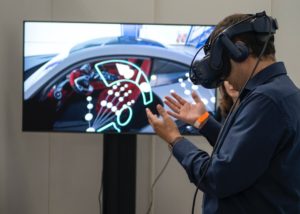
How has VR changed recruitment?
Here are some of the ways VR has changed recruitment.
Selection & Interviewing.
Throughout the covid 19 pandemic, recruitment, hiring, and onboarding went digital. VR played an integral role in this online process, helping decision-makers select and evaluate the skills of their candidates. For example, the skills of a software engineer could be tested in a real-world scenario. By creating a virtual setup in which applicants must solve a bug or test a code, interviewers can better assess their ability.
VR enables a 360 exposure to a scenario. Candidates can be immersed in problems they may encounter on the job, giving hiring managers a true insight into how an individual may perform in real-time, eliminating the “What would you do if…” uncertainty.
By its nature, VR enables a 3D interaction and takes the interview process to new heights. Remote and video conference solutions offer a 2D solution, and as such nuances and subtleties are easily missed. For example, body language can reveal a lot about a candidate and sends subtle cues during in-person interviews. VR allows the hiring manager to take the traditional remote interview one step further.
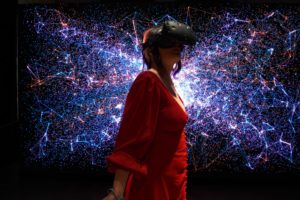
Work culture and brand values.
Candidates place shared values at the top of their priorities when choosing a new role. Jobseekers use social media and review sites to assess a brand’s values and company culture. VR allows employers to offer virtual office tours to candidates, give testimonials of employees, and show immersive promotional material to help them win the war for talent.
VR gives the candidate a natural feel of what it would be like to work in the office and as a result, allows them to make more of an informed decision about where they choose to work. It also allows an employer to show off what they do well; it is a far more inclusive experience than a website or social media profile.
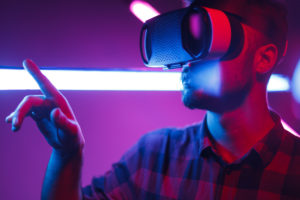
Hands-on training and assessment.
VR technology enables recruiters to assess how candidates may perform specific job functions. This can be particularly helpful in professions that require the use of specific tools and equipment.
Deloitte has found that the use of VR training tools in a learning program results in faster and better learning. As a result, many businesses are now employing these next-gen methods in their hiring processes.
The preparation process.
It’s not only the employer that has benefited from the VR revolution. VR has also elevated the opportunities for job seekers.
Candidates who are seriously looking for new jobs can use VR-enabled applications to prepare for their job interviews.
These apps present the jobseeker with various questions that are specific to their industry. Candidates then respond and receive immediate feedback on their performance and answers.
VR offers a full 360 preparation experience. It gives candidates a chance to assess their competency and build confidence in advance of the actual interview.
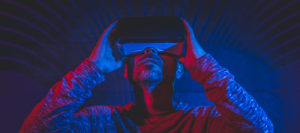
A magnet for the tech-savvy.
No matter what sector you work in, being tech-savvy is becoming more and more critical. Offering candidates a VR interview experience will attract the right sort of talent; one with a progressive mindset and a tech enthusiasm.
The cutting-edge technology of VR in the recruitment process can play an integral role in appealing to a broader audience and can help to encourage diversity in applicants.
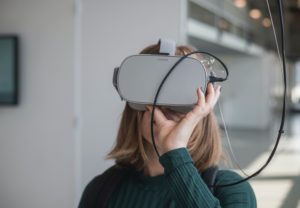
The hurdles that VR presents.
VR in recruitment is set to become commonplace and has started to make a significant mark on the sector. However, despite its benefits, there are some hurdles it presents. The cost of the tech or lack of experts onsite to implement these solutions can hinder organisations from leveraging the full potential of these tools.
In the future.
VR technology will continue to grow and will only become more advanced. In turn, its uses and applications will become wider ad wider. The potential it holds is massive.
Hiring and recruitment will benefit from its ability to be immersive, inclusive, and informative. The world of recruitment looks set to remain online. Remote interviews, remote onboarding, and remote roles mean that geography is no longer a barrier. Organisations that can offer these conditions will continue to thrive by being able to hire the talent they need despite distance or location.
Through these technologies companies can ensure they attract and hire the right candidates; those with both the technical skills required and a shared value system.
What do you think?
Have you ever experienced a job interview that included a virtual reality task or have you ever offered a virtual interview to your job applicants? We’d love to hear about your experiences in the comments section below.
Are you a tech candidate looking for a new job? Head over to our job pages to browse through our exciting opportunities!





